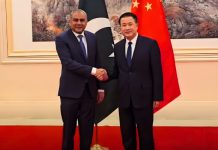DM Monitoring
FALMOUTH: G7 leaders on Friday open a three-day summit aimed at helping to end the -19 pandemic and forge a climate-centric economic recovery, after pledging to donate one billion vaccine doses for the world’s poorest countries.
US President Joe Biden and his colleagues from Britain, Canada, France, Germany, Italy and Japan will sit down for their first face-to-face gathering in nearly two years, after the pandemic wiped out last year’s summit.
Meeting under the protection of a smothering security operation in the Cornish resort of Carbis Bay, southwest England, the leaders are also expected to address warnings to Russia and China.
Most of the G7 heads of state and government will reconvene on Monday in Brussels for a NATO meeting, before Biden heads on to his first summit with President Vladimir Putin in Geneva, vowing to deliver a blunt appraisal of Russian behaviour.
After arriving in Britain Wednesday on his first foreign tour as president, Biden told US service personnel that “the United States is back and democracies of the world are standing together”, following the tumult of his predecessor Donald Trump’s go-it-alone administration.
The G7’s host, British Prime Minister Boris Johnson, said the coronavirus outbreak originating in China had also “badly shaken” the international order. “At Carbis Bay, we must put those days behind us,” he said in a pre-summit message.
“This is the moment for the world’s greatest and most technologically advanced democracies to shoulder their responsibilities and to vaccinate the world, because no one can be properly protected until everyone has been protected.”
Building on Biden’s pledge to order 500 million -19 vaccine doses to distribute among poorer nations, Johnson plans to commit Britain to offering “at least” 100 million surplus doses within the next year. In total, the G7 leaders are expected to adopt a broader commitment of offering up to one billion doses, in order “to end the pandemic in 2022”, according to Downing Street.
The World Health Organization regional director for Africa, Matshidiso Moeti, said vaccine-sharing was a “do or die” issue, with doses running short and cases rising across the continent. Campaigners have slammed inequalities in distribution as “vaccine apartheid”, calling on rich nations to do more to help the global south, including by waiving intellectual property rights on vaccines and treatments.




